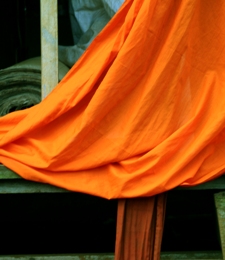| |
|
 |
Thought for the Day: climate change a spiritual issue
December 11 2007:
By Vishvapani
I first learned about Balinese culture when I studied its extraordinary theatre traditions as a postgraduate.
 |
 |
 |
"at root, the climate crisis isn't just political, economic or even environmental. It's spiritual."
|
The transfixing re-enactments of ancient myths are just one aspect of an incredibly rich culture where artistic and religious customs are woven into daily life.
The survival of those pre-industrial values makes Bali a fitting setting for the latest climate change talks. As delegates struggle towards a framework for emissions targets, and scientists warn that still more drastic action is needed, governments seem to be seeking two incompatible objectives: continued economic growth and an end to the environmental damage it's causing.
Individually, we're also troubled. We buy energy-saving light-bulbs, recycle more and worry a little about our holiday flights. But our efforts are mainly at the edges of our lives and often seem inadequate. What politicians can't admit is that reducing carbon emissions on the scale scientists advise would require a fundamental change in society.
Doubtless, technological advances and renewable energy sources can help, but the scope of the change challenges the model of ever-increasing wealth on which our society is built.
We need help in envisaging a meaningful life and a healthy society that aren't based around consumption. Perhaps that's where religions can help.
The Buddha described the human condition by the evocative but untranslatable word, dukkha. It means 'suffering' or 'unsatisfactoriness' or maybe 'lack' -- the feeling that things aren't quite right. The root of this dukkha, he said, is craving, and our search for security impels us to gain more power and possessions, though, ironically, these only bring further suffering to ourselves and -- as we're seeing -- to the world.
Escaping this cycle means facing the sense of lack directly, and if we do so an array of alternative values and pleasures comes into view. A simpler life that's free of compulsive distraction allows space for awareness, friendship and deeper reflection.
The Buddha and his monks lived in the forest without possessions or money and survived by begging food from householders. That may seem a distant ideal, and it's not how I live; but I do try to live simply and be contented with what I have.
We may be inspired by a traditional culture like Bali's but the challenge for religions such as Buddhism is to show how our ancient values and practices can help the modern world.
That's important because, at root, the climate crisis isn't just political, economic or even environmental. It's spiritual.
copyright 2007 BBC. Republished with permission.
LinksListen to the full broadcast here.
Link here for the Thought for the Day website.
Link here for the BBC's Religions Department.
Link here for more information about Vishvapani.
|
 |
 |
|
|
|
|
|
 |
May 11 2006:
BBC works with ARC for special climate change Songs of Praise
As part of the BBC’s groundbreaking “Climate Chaos” season this month, Songs of Praise is broadcasting a special programme on May 28 to explore the Christian contribution to the environment debate. It includes an interview with ARC’s Martin Palmer about how caring for nature is integral to Christian thinking. |
 |
December 7 2007:
UN and ARC launch programme with faiths on climate change
The UN has asked ARC to help launch an innovative programme for faiths to tackle climate change.
This is the first time the UN has involved the faiths at this scale. |
 |
Projects overview
A complete listing of all current ARC projects |
 |
 |
|
|

